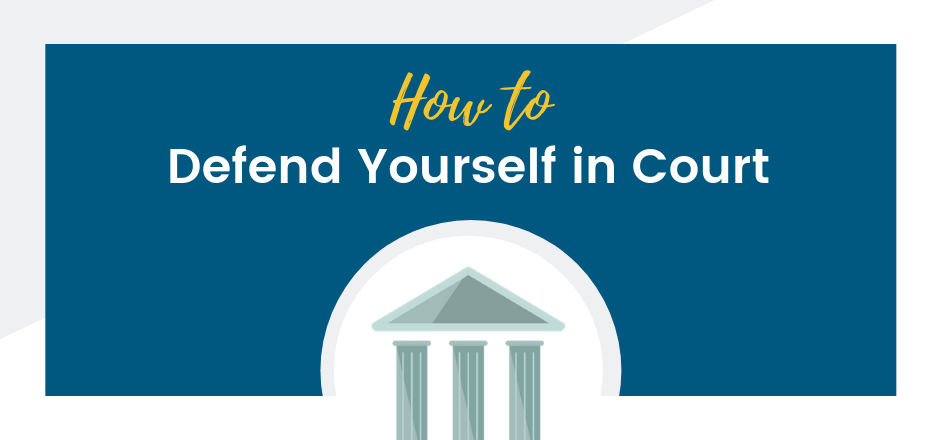How to Defend Yourself in Court

There are a variety of reasons you may want to consider representing yourself court. For the best results, you need to have a good understanding of how to defend yourself and your interests. Today, we’re taking a closer look so you’re prepared.
Here’s how to defend yourself in court.
How to Defend Yourself in Court
Have you been accused of a crime and/or listed as a defendant in a civil court case? Your first and most important step should always be to hire a lawyer who can guide you through the system with expertise and knowledge.
If you cannot afford to hire a lawyer, or don’t want to pay for a lawyer, the court may offer you the option to use a public defender. However, it is also possible to represent yourself in court instead. In essence, you become your own solicitor, meaning you do all of the legwork to research, present, and argue your case.
If you are considering self-representation, it is critical that you have all of the facts about this complex and difficult process before you begin. From weighing the risks and advantages of self-representation to learning how to adequately defend yourself in court, we encourage you to use this guide as a starting point.
Should You Self-Represent?
It is impossible to give a definitive answer to this question without knowing the specifics of your case. While defending yourself in court can help you save money, it is rarely the right decision for a variety of reasons.
Defendants who self-represent without understanding the process, or how to successfully argue a case, may inadvertently sabotage their own success.
You Must Have Legal Capacity
First, if you want to defend yourself in court, you must hold “legal capacity.” The state of California designates that any person who holds the legal capacity for themselves has the right to represent themselves in court.
“Legal capacity” means the individual is legally able to enter into a contract and/or agree to the terms and conditions associated with attending court.
Minors, people who are identified as mentally incompetent (e.g, someone with severe dementia), and anyone who cannot obviously perform the duties associated with self-defense (e.g, someone who is ill and in a coma) cannot defend themselves in most cases.
Minors may be able to represent themselves under the guidance of a guardian ad litem or on their own if they are emancipated. However, it is extremely rare for courts to agree to this type of arrangement because minors do not, by definition, hold legal capacity until age 18.
Why Defendants Self-Represent:
Defendants may opt to self-represent because they cannot afford a lawyer or don’t want to spend the money for a lawyer. This is often the case for defendants facing very small issues (such as parking tickets).
Although the courts will sign a public defender in criminal cases, some defendants have concerns about the quality of services provided. They may feel they stand a better chance of winning if they self-represent.
The courts do not assign public defenders in civil court cases. Someone who is sued may be forced to defend themselves if they cannot afford a lawyer.
In small claims court, defendants are not permitted to hire a lawyer or bring a lawyer to court. Instead, they must defend themselves at all times.
Some defendants are deeply aware of the law or feel they can better represent themselves than a lawyer ever could. This is often the case for activists engaging in acts of civil disobedience.
Risks of Self-Representation:
- Extremely complex cases that touch on multiple areas of law or involve very extreme punishments (e.g., armed robbery or capital murder) are almost always best handled by lawyers. These cases often demand expert witnesses, and an in-depth understanding of precedence, and sometimes, even an understanding of how the plaintiff’s lawyer argues, in order to succeed.
- Being unfamiliar with the California court system, such as when you should ask for a jury, how to file a motion, how to respond to court documents, or where to file a response, can jeopardize your case. It takes only one missed opportunity or misplaced document to cost you your case.
- Lawyers work in confidence, meaning they cannot share anything you tell them in private with any other party. This special relationship allows the lawyer and defendant to honestly discuss and strategize on issues related to the case. Self-representation does not afford this benefit.
- You may be willing to fight fairly, but that doesn’t mean the plaintiff or person accusing you of a crime will play fair, too. For example, a spouse may hide assets in an attempt to dodge alimony. A lawyer is far more likely to recognize problem behavior from the other side than the average layperson.
- If you are charged with a very serious crime and opt for a jury trial, the decision to self-represent could present unique risks. Choosing a jury, and arguing the evidence to a jury, requires complete objectivity, which may be difficult or even impossible for a defendant to achieve.
How to Defend Yourself in Court
You took the time to investigate the process of self-representation and still believe it is the best decision for your case. Now, it’s time to prepare.
- Get to Know the Law: Identify the laws associated with your case (e.g, family law, criminal law). Research how the laws work, which precedents (past case outcomes) exist to influence your case, and which options you have at your disposal for resolving the case out of court, if any. If you can, consult with a lawyer at least once at this step to ensure you fully understand your case.
- Learn About Court Procedures: Become a self-directed expert on procedures associated with the court system. The California Code of Civil Procedure provides helpful information on civil court, while the California Rules of Court provides information on procedures for criminal court. See the superior court local rules for procedures associated with, or specific to, the Supreme Court.
- Try to Resolve Out of Court: If options exist for resolving the case outside of court (e.g, arbitration or mediation), consider whether those options may present a more reliable outcome. If the other parties agree, these alternatives are almost universally the better choice compared to self-representation. See Resolving Your Dispute Out of Court for more information.
- Understand Court Deadlines: Know your case deadlines, including when to file, when to appeal, when to submit evidence, and when to give notice. Not having experience in the legal system is not an excuse for missing these deadlines. Some deadline issues, such as failing to appear due to a forgotten court date, could even put you at risk for arrest or additional charges.
- Attend Court as a Spectator: Attend other court cases as a public spectator. Watch carefully to identify how cases flow, who speaks first, how much time each person has to speak, which evidence the judge or jury requests, and how the lawyer or defendant argues their case. Use this valuable experience to learn how lawyers argue, how to speak to a judge, and/or how to interact with a jury without breaking court rules.
- Prepare Well in Advance: Be prepared – always. Showing up without a critical document can make or break a case; “I didn’t know I needed it” isn’t an acceptable excuse. It is best to document everything. This includes photo or video evidence, papers served from either side, subpoenas, text messages, chat messages, letters, and anything else relevant to your case. Keep evidence organized by labelling each piece with the word “Exhibit” and a number (e.g, “Exhibit 1”). You should be able to retrieve any exhibit in only seconds if it is requested.
- Show Respect and Professionalism: Be respectful and conduct yourself in a professional manner at all times, no matter how much your emotions rise. Speak clearly, stay on topic, and never insult the other party. Use terms like “your honor” and “the plaintiff” to address the judge and the other party, if civil. If you are in criminal court, use the alleged victim’s first and last name instead.
- Speak Clearly, Without Loaded Terminology: Let the evidence speak for itself. Don’t try to manipulate the judge or jury into ruling in favor of you by using loaded language and/or terms. It is your job to present the evidence in a way that’s clear and easy for everyone to understand. It is the court’s job to judge whether the evidence is compelling enough to convince them to allow you a win.
- Take Responsibility: If you do make a mistake, take responsibility for it. Apologize to the judge, the plaintiff, and the court. Do not make excuses or try to explain away your mistake. A judge or jury is much more likely to be sympathetic to someone to takes responsibility for a real procedural mistake than someone who starts off with “It’s not my fault because…”
If you feel forced to self-represent for financial reasons, know that you may have access to other options. LawHelpCa.org, your city’s public defender, lawyer referral services, most law schools, and the American Bar Association’s American Prepaid Legal Services Institute’s listing of legal service plans can help you find, and secure, free or low-cost legal advice and assistance.
Conclusion
Now that you know how to defend yourself in court, you can make an informed decision regarding whether or not representing yourself is the best approach for your particular legal matter. There are a lot of reasons people opt to represent themselves in court, but the most prepared are aligned for the best result.
Be sure to spend time preparing for your case. If at any time you feel overwhelmed, let us know and we’ll help you find a lawyer in the Los Angeles area who can help.
Are you in search for a certified attorney to represent you?
Let us help you find one today!


